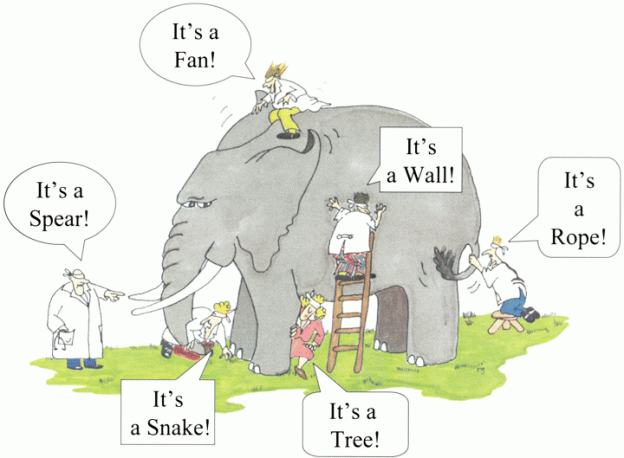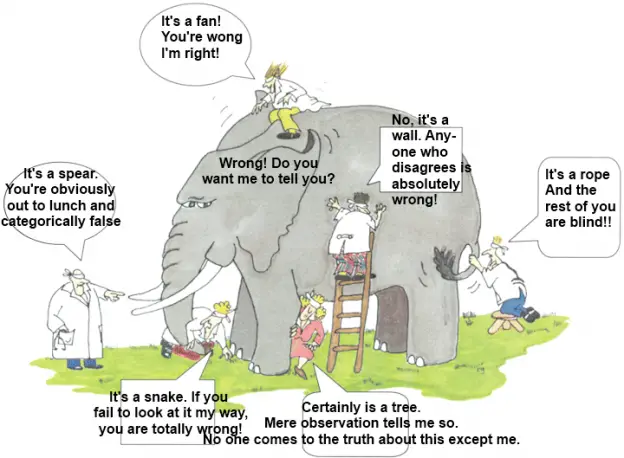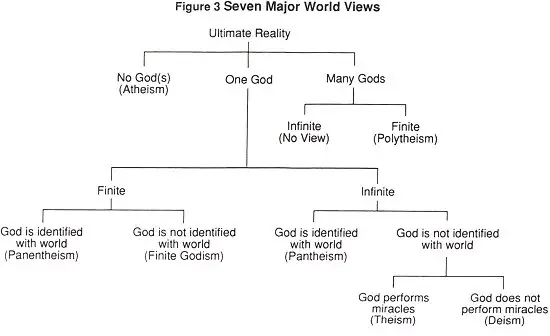What Is Truth?
An Investigation into the
Nature of Truth and Worldviews
Worldviews:
The original title to this lecture was…
Epistemology: Do We Really Know How We Know What We Know? And What is That?
But for the sake of simplicity, we will entitle the lecture
How to Know Truth and Evaluate Worldviews
Everybody Cares about Truth
Let’s say you are talking with a friend and he says that he does not care about truth. What do you say?
For example you could proceed along these lines…
Let’s say someone you love was sleeping in front of an oncoming train.


If the train was travelling at 574.8 km/h, and the person you’re talking to does not care about truth, he also would not care to make a decision about getting out of the way or not. He would not care to know the truth about whether the train could hurt or kill him. There are some things that you just need to know the truth about.
The same goes for whether or not there is a Creator who determines your eternal destiny and whether there is a heaven or hell. If there is no God, it really doesn’t matter. But if God exists, then you should want to know that.
After someone is attracted to knowing the truth, in order to come to truth, therefore, we need to know certain principles.
“Absolute truth exists and is really knowable.” By absolute truth, we’re talking about a fact that transcends personal, subjective or conditional existence. An absolute truth is a factual statement that is true and is not limited by personal experience, time, or culture. It’s true everywhere and at all times.
For example, either God exists or God does not exist. Both cannot be true.
To argue otherwise is self-defeating.
Someone in turn might argue that, “Okay, you can know things that are absolutely true if they are in the realm of science and history. But when it comes to things pertaining to God, all we have to rely upon is ‘faith’.”
How would you respond to this?
After the person we’re dealing with is attracted to the truth and to knowing the truth, in order to come to truth, we need to determine if the person is open to the facts as they present themselves.
Everyone interprets facts based on the perspective of the world that they already have. Everybody does this.
For example, centuries ago people believed that the sun revolved around the earth. They did not have the facts that we have today. They saw the sunrise and sunset just like we see the sunrise and sunset. They have the same data that we see. However, they had a particular worldview that caused them to misinterpret the facts. They were out of touch with reality.
In order to correct their perspective about the relationship between the sun and the earth, they needed to…
1. Recognize their bias
2. Be open to additional facts
3. Be willing to change their perspective by the facts
This would be the same in an apologetic encounter. But say you are talking with someone. Try to help someone understand that it is only reasonable to have some respect for the worldview that best explains the facts
Show someone the idiocy of holding to a worldview that has to…
Facts: Comets are continually being lost through decay, collisions with planets. Billions of years would be plenty long enough to cause all comets to cease to exist.
In order to explain the existence of comets, evolutionists need a way to “resupply” the solar system with comets. Thus, the oort cloud was dreamed up, although never discovered.
This is weak. Sure, they have an “explanation” but it is something that they just made up.
How can this be satisfying? So, if I were shopping for worldviews, I would see that the creationist worldview has won this argument.
So, the person you’re dealing with needs to be prepared to give weight to the interpretation of the facts that best explains the evidence and has the least amount of problems (immaterial laws in a materialistic universe; existence of comets).
This nicely leads us into the third principle…
Someone might say to you, “you can’t know for sure that God exists” or “you can’t know for sure that Jesus really rose from the dead” or “you can’t know for sure that the Bible is really God’s word”. “Unless you can prove it with absolute certainty, I will not believe it.”
Okay, yes, you can’t know anything to be true with absolute certainty, the way they desire a truth to be known.
However, you can’t be absolutely certain of the fact that you are even sitting here listening to this lecture because you can’t prove it beyond a shadow of a doubt. Theoretically, you could be dreaming, hallucinating, living in an alternate universe, etc.
Some of these conclusions are absurd.
However, this lends itself to the conclusion that therefore, proving something beyond a shadow of a doubt or proving it absolutely or having absolute certainty is not required for you to “know” something to be true.
If (my son) Paxton has a crayon and the wall is covered with crayon, even though I do not have absolute certainty that Paxton was the one colouring the wall, I cannot say, “well, I do not know for certain that Paxton coloured the wall. Therefore, I should not discipline him. Maybe it was an alien.”
If I said that, it would be ridiculous.


↑This guy is responsible. He knows enough about the world. He is “without excuse.”
Therefore, this principle I just explained tells us that you are sure enough about a particular subject that you can make the obvious conclusion that that subject is true and therefore you are responsible to act upon it. So it is with every unbeliever (Ro. 1 –see previous lecture). Every unbeliever knows enough about the universe already to come to an understanding about the nature of God and His judgment. Every unbeliever is already responsible if you talk to him about it or not.
Now, let’s test some worldviews…
Testing Worldviews
Again, a worldview is the way that someone looks at all of reality. It is the summation of all of his beliefs that govern how he responds to the world. It is a framework of your convictions that influences how you understand and interpret the world.
Humanism and naturalism as well as Buddhism, Deism, postmodernism are all worldviews.
All of these worldviews are in competition. Today more than ever, people conclude that everybody is right. “All roads lead to God.” “We’re all climbing up the same mountain.” “We are all blind men touching the same elephant.”

This is an attempt to equalize all religions and make them all equally true in their description of God. This is actually an arrogant position. It says I know the truth and you all have a part of it.
Even though each blindfolded scientist is observing the same big animal, the description is radically different. Just like no one religion can know the whole truth (the truth is beyond us), no one blindfolded scientist can come to the right conclusion that it’s an elephant.
Similarly, the different religions of the world are describing the same thing, but radically different from one another. Thus, the argument goes, no one religion has a corner on the truth; each religion is as valid as another.
How would you respond to this?
First, your textbook.
Secondly, the reality however, is more like this. Notice what wording I’ve added…

What’s the point of the added content?
What’s the point of what the elephant says?
Each religion, represented above, is not merely saying they know what truth is, but they are saying they know the truth and no one else does!
However, Ro. 1 clearly teaches us that everyone is actually touching different animals! They are worshipping the creature, not the Creator.
Anybody can see that not all of these people can be right. Similarly, all religions cannot be right either.
For example, atheism and theism contradict each other. God can’t both exist and not exist at the same time and in the same sense.
Also, a worldview either fits or it fails to fit the facts of reality. Either a worldview adequately explains our universe or it fails in some way to adequately explain our universe. There’s only one reality to explain and we are all living in it. There’s only one elephant and if you think the tail is a rope or the leg is a tree or the trunk is a snake, you are clearly suppressing the truth though you think you’re searching for God!
Someone has to concede then that all religions aren’t studying the same animal. Hopefully it’s then that they understand they have to “shop for worldviews.”
The question for shopping for worldviews is, “is a particular worldview consistent with reality?”
To answer this question, there are three tests.
1. The test of logical consistency, “Is this worldview consistent with itself?”
2. The test of historical consistency, “Is this worldview consistent with history?”
3. The test of experiential consistency, “Is this worldview consistent with the data of life, with experience?”
Let’s take some examples now….
Postmodernism
This worldview states that everybody should decide for himself what is true and what is moral. A postmodernist will say, “I’m glad you have found truth for yourself; that is not true for me.” Or, “that’s just your personal belief.”
These folks do not believe in a truth claim that applies to everybody. There are no absolute truths.
Let’s run it through just 2 of our tests…
1. The test of logical consistency, “is postmodernism consistent with itself?”
As we pointed out earlier, postmodernism fails the test of logical consistency because they claim that there are no universal absolute truths that apply to everybody. By doing this, they have just made a universal, absolute truth statement. This then contradicts itself. It is not logically consistent.
3. The test of experiential consistency, “is this worldview consistent with other data of life?”
Obviously, if all truth is subjective the claim that having paid one’s taxes can coexist with not having paid one’s taxes is to say the same thing as being in jail can coexist with not being in jail. Obviously, this is not consistent with the data of life.
Excursus
Does anyone really believe this? You betcha!
The below article from: http://www.foxnews.com/opinion/2012/01/29/does-prayer-work/
“Does prayer work? I mean really work?
You bet it does!
But saying that does not mean that prayers are the spiritual equivalent of coins which we place in a Divine vending machine and that if we put the right ones in, in the proper sequence, we will automatically be granted whatever it is we ask for, especially in tough times. That would be magic or manipulation, not prayer.
Don’t get me wrong, I believe in a personal God – one who listens to my prayers, especially when those I love are suffering, when I am at a loss, or when things seem so dark in the world that there is no other response that makes any sense.
I pray to that God and hope that I do get what I want, but we all know that’s not exactly how it works. I wish it were that easy.
[talks about prayer for healing doesn’t always work]
In my experience, prayer works not as a manipulation of God, but as an opportunity to connect more deeply with ourselves and to experience the reality that we are not alone, no matter how much we may feel that we are at any given moment. And there is plenty of evidence for the material benefit of overcoming loneliness and alienation, restoring a sense of hope, and reminding ourselves that there are sources of strength upon which can [sic] always draw – whether they are located within us, within those who care about us, or within the God in whom we believe. So yes, prayer works.”
Your thoughts on this?
So….who wrote this?
Rabbi [deacon’s name] Hirschfield is the author of “You Don’t Have to Be Wrong for Me to Be Right: Finding Faith Without Fanaticism,” and president of Clal-The National Jewish Center for Learning and Leadership.
From Amazon…
We live in a world,” says [deacon’s name] Hirschfield, “where religion is killing more people than at any time since the Crusades.” And when it comes to fanaticism, Hirschfield is not speaking abstractly; he once embraced it. As a young man in the early 1980s, he left his family’s upscale North Shore Chicago neighborhood for the West Bank city of Hebron, where he joined a group of settlers who were committed to reconstituting the Jewish state within its biblical borders. He carried a gun and, on one occasion, used it. …
Now, Hirschfield has renounced all such rigid delineations of people into categories of totally right and totally wrong, entirely good and entirely evil. He seeks to build bridges among people of different faiths—and those with no faith at all. He is devoted to teaching inclusiveness, celebrating diversity, and delivering a message of acceptance—not as feel-good pabulum but as forceful and indispensable antidotes to the blind passions and willful ignorance that threaten us all [emphasis mine].
How would you respond? Here’s an amazon review…
“If everyone is always right, there is no wrong. Following that logic there is no left or right, no up or down, no inferior or superior. Everyone and everything is ground/sea level, mediocre, okay, can’t move sideways or climb a mountain, and therefore stationary, and in fact so static as to be a zero. If there is no right, there is no wrong. If everything is relative or everyone is right, then wrong does not exist. Therefore “terrorism” is OK, the Halocust was OK, the Inquisition was OK, all war is Ok, the nuclear bomb is OK, murder is Okay (as long as it isn’t me) etc., etc., etc. The logic escapes me. The concept terrifies me. The book sounds very “nice” as long as one is talking about behaviors and beliefs/values that do nothing harmful physically or sociologically to others. Where did this rabbi learn his judaism? must have been from an atheist (whoops—how politically incorrect of me not to recognize atheism as a valid religion)!
This book is full of a lot of silly, trivial examples about 2 very basic and infant-learned (ego) concepts called “right” and “wrong” about self. It is not instructive about ethical decision making which is the more mature form of discriminating about life. But then, maybe the rabbi is right as long as I’m not wrong.”
This man is an example of post-modernism at work in religion. The above tests will help us defeat the arguments.
Let’s test another worldview now…
Naturalism
Naturalism teaches that the materialistic universe is all that exists. People will say that, “everything has to have a scientific explanation” or, “if it is unobservable it does not exist.”
Let’s run the experiential consistency test.
3. The test of experiential consistency, “is naturalism consistent with other data of life?”
Not only are immaterial laws unexplainable in the materialistic universe, but also our experiences. For example, the data of life tells us that there are real things like love and hatred. However, naturalism cannot account for the existence of love and hate. It doesn’t have a justifiable answer to the question, “Why do love and hate exist?” Material things cannot love or hate for example, atoms cannot love and energy cannot hate. For the atheist to go home to his family and say, “I love you” is at best disingenuous based on his worldview.
If humans are modified pond scum, human expressions of love are illusions and are not absolute and universal values in life. Other examples would include the sense of beauty or the demand for justice.
And if these are illusions, as some atheists claim, how can matter and energy produce an illusion? Their worldview fails to account for basic facts of life. It is not consistent with the clear of our life experiences.

Go to Apologetics Lectures Main Page
